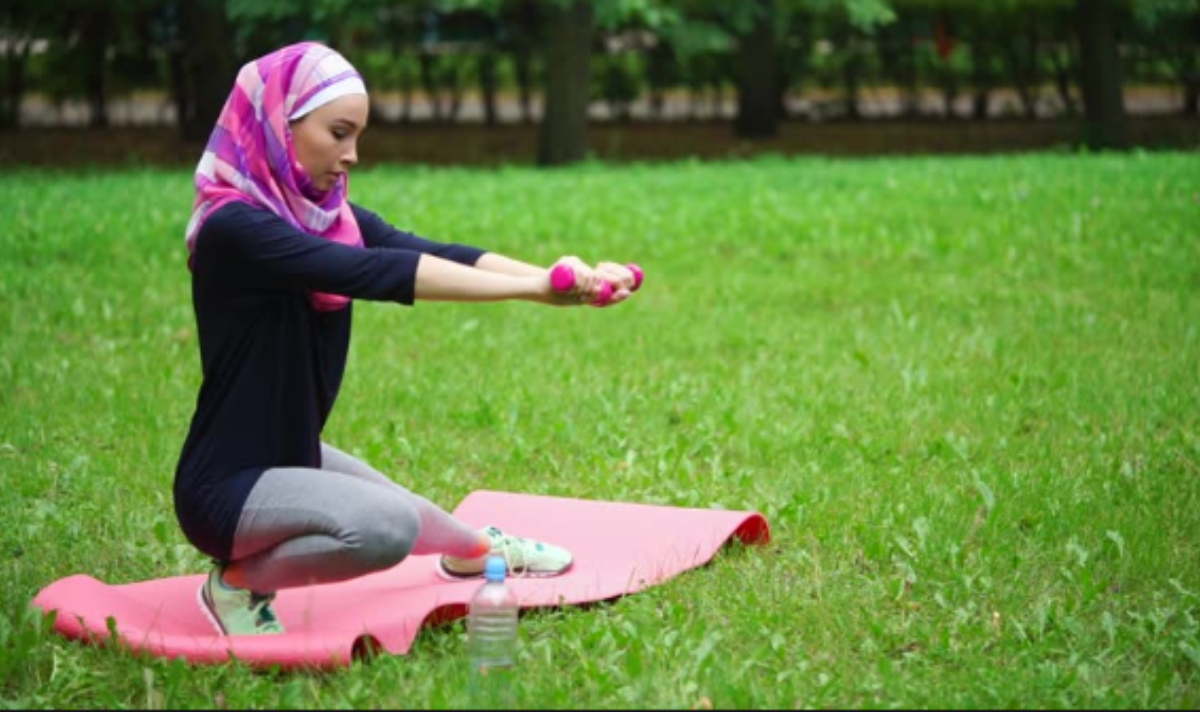It's that time of the year again! Ramadan will be between April 23 and May 23 this year. During this time, Muslims in the UK and elsewhere around the world will be fasting, spending time with family, and celebrating this important time.
If you want to continue to work out during Ramadan while fasting, you should keep a few things in mind. If you are observing Ramadan in the UK, you will be fasting between 3 AM and 9 PM this year. That means if you are following the official rules of this holy month, you won't be eating or drinking anything for those 18 hours. That begs the question: can you work out during Ramadan? The answer is yes!
Guidelines for Working Out During Ramadan
While you can keep working out during Ramadan, you will want to take some precautions before doing so. Given how close to summer it is this year, your eating and sleeping window is considerably smaller than it is sometimes. This will make it more challenging to work out, but it is doable.
Here are a few pointers for how to work out during Ramadan while fasting. When you follow these guidelines, you ensure that you can still effectively work out without it being dangerous for you to do so.
Avoid Starting New Exercises
If you were considering beginning a new exercise programme, then think again. This is not a time to start something entirely new that you are unfamiliar with. You may end up taxing your body way more than you may realize is possible. This is especially true if you’re not working out regularly.
During Ramadan, stick to your current routine. You may even want to lighten up on the intensity so you don’t become too dehydrated or fatigued. Low-intensity exercises will be the best kind to do while you are working out during the month of Ramadan.
Eat Healthily
Since your eating window will be very small during Ramadan, you will want to stay on top of your diet like a hawk. That means eating foods that will optimize your energy levels, as well as avoid foods that deplete it.
Shy away from sugary drinks and stick to water or coconut water for hydration. With that being said, avoid refined sugars of all kinds, along with processed and fried foods. These foods will only make you more thirsty, which could make your Ramadan quite miserable.
Rehydrate Properly
Since you will have to wait to drink fluids until after sunset, you may want to get in as much as you can. However, this will not be the smartest decision to make. Ideally, you should rehydrate slower and throughout the period when you can do so. Otherwise, your body will be unable to efficiently absorb all of it.
If you decide to work out after sunset, then stay on top of drinking a bit of water throughout your exercises, as well as afterward. We recommend drinking around 2.5 litres and taking some vitamin C along with it. Antioxidants like ginger and turmeric can help boost your immune system, which will be strained while fasting. Besides sugary drinks, you will definitely want to avoid drinking caffeine. It's only going to dehydrate you over the long run, making fasting even more challenging than it already is.
Avoid Overeating
You may initially think that if you stuff yourself with as much food as possible after sunset, you will make up the calories you lost. However, your body can only effectively convert so much food into energy in a given period. You should stick to eating how much food you normally would.
You can make the most of your food by ensuring it is as nutritious as possible. Complex and fiber-rich carbs will release their nutrients slowly, helping you get the most out of the food you do end up eating. Some great options are:
Rice
Quinoa
Beans
Lentils
Once it’s time to break your fast, you can pop a few dates in your mouth for quick energy. They are also rich in potassium, which will get your muscles and nerves functioning properly after a long day of fasting.
Accept Losing Some Muscle Mass
We would love to tell you that you’re not going to lose any muscle mass during Ramadan. However, there is no magic way to avoid it entirely. However, when you follow our tips for how to work out during Ramadan while fasting, you’ll only lose a little bit. Accepting this small and temporary loss in muscle mass will help you get through Ramadan without getting down.
This year's Ramadan is going to be more difficult than usual if you exercise. After all, the pandemic-related restrictions have led to 24-hour gyms being closed. That makes it more challenging to get a hold of heavier weights and equipment during the late hours of the night. It's worth the brief reduction in muscle mass to follow this very holy month if you are Muslim. You'll get that muscle mass back fairly quickly once Ramadan is over.
Conclusion
Once you've been out of your normal workout routine for an entire month, you may initially feel like you are weaker. However, the situation will not be as bad as it may seem at first. After all, you've got muscle memory, which will help you quickly get back to where you were before the month. There's no need to stop exercising during Ramadan. Sure, you will have to modify your workouts, but you can still do it. Getting over the psychological barriers may be the biggest obstacle for you.
Go easy on yourself! Your body may wonder what is going on for those first few days of Ramadan. However, it will adjust and get used to the "new normal" you are putting it through. You should pay attention to how you are eating and how much you are pushing yourself. When done right, a workout during Ramadan while fasting is completely doable!

